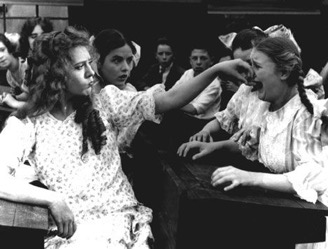
Director: Eric R. Dahlen, Ph.D.
Summer Boggs Defends Thesis
06/16/23 Aggression
Summer Boggs, a doctoral student working in the lab, successfully defended her master’s thesis yesterday. Summer’s thesis, "Social Anxiety and Relational Aggression in the Peer Relationships of College Women," examined the possible role of fear of negative evaluation in relational aggression in a sample of college women, utilizing Social Information Processing theory. Summer's sample proved to be unusually high on every measure of anxiety used, suggesting some limitations in the generalizability of her findings. Contrary to her predictions, fear of negative evaluation was not associated with higher levels of relational aggression. On the other hand, a broader measure of social anxiety did show a relationship with relational aggression, some of which was mediated by hostile attribution bias.
Congratulations to Summer on her successful thesis defense!
Congratulations to Summer on her successful thesis defense!
Savannah Merold Defends Dissertation
09/14/22 Aggression
Savannah Merold, an advanced doctoral student who recently completed her predoctoral internship at the U.S. Medical Center for Federal Prisoners in Springfield, MO, successfully defended her dissertation this week. Savannah's dissertation, "The role of mate seeking motives, status acquisition motives, and dark personality in predicting responses to an aggression-provoking situation," synthesized research from evolutionary and personality psychology. She used vignettes designed to activate social motives thought to be relevant to aggression (e.g., mate seeking, status acquisition), assessed dark personality traits, and examined participants' responses to an aggression-provoking scenario.
Although Savannah found evidence that the vignettes activated the intended motives for women, this was not the case for men. The smaller number of men in the study and some methodological limitations resulted in insufficient statistical power to detect these effects in men. Overall, hypotheses about social motives and dark personalty traits interacting with gender to predict aggressive responses were not supported. Future research in this area is likely to benefit from using much larger and more diverse samples that will permit more extensive examination of gender main effects and interactions.
Congratulations to Savannah on accomplishing this important milestone!
Although Savannah found evidence that the vignettes activated the intended motives for women, this was not the case for men. The smaller number of men in the study and some methodological limitations resulted in insufficient statistical power to detect these effects in men. Overall, hypotheses about social motives and dark personalty traits interacting with gender to predict aggressive responses were not supported. Future research in this area is likely to benefit from using much larger and more diverse samples that will permit more extensive examination of gender main effects and interactions.
Congratulations to Savannah on accomplishing this important milestone!
Alison Poor Defends Dissertation
06/28/22 Aggression
Alison Poor, an advanced doctoral student about to begin her predoctoral internship at the Southeast Louisiana Veteran’s Healthcare System in New Orleans, successfully defended her dissertation yesterday. Ali’s dissertation, “Predictors of relational aggression in women across adulthood,” extended the literature on relational aggression among women by testing a moderated mediation model based on social information processing theory (Crick & Dodge, 1994) and comparing 3 developmental groups of women between 18 and 65.
Ali found that the relationship between relational victimization and relational aggression was partially mediated by anger rumination and hostile attribution bias and that normative beliefs about relational aggression moderated some of these relationships. Overall, her findings support the continued relevance of relational aggression among women through middle adulthood.
Congratulations to Ali on an impressive dissertation defense!
Ali found that the relationship between relational victimization and relational aggression was partially mediated by anger rumination and hostile attribution bias and that normative beliefs about relational aggression moderated some of these relationships. Overall, her findings support the continued relevance of relational aggression among women through middle adulthood.
Congratulations to Ali on an impressive dissertation defense!
Alison Poor Wins Research Award
12/03/21 About
We just learned that Alison Poor, an advanced doctoral student in the Anger and Traffic Psychology Lab, won a Peggy Jean Connor Research Award that will provide her with $960 to support her dissertation. Ali’s dissertation, “Predictors of Relational Aggression in Women Across Adulthood” will use MTurk to recruit participants, and this award should cover her payments to participants.
The Peggy Jean Connor Research Award is given annually by the University of Southern Mississippi’s Committee on Services & Resources for Women to promote research on gender issues by faculty and graduate students and professional development activities for staff. As part of the award, Ali will present her research in March.
Congratulations, Ali!
The Peggy Jean Connor Research Award is given annually by the University of Southern Mississippi’s Committee on Services & Resources for Women to promote research on gender issues by faculty and graduate students and professional development activities for staff. As part of the award, Ali will present her research in March.
Congratulations, Ali!
Savannah Merold Proposes Dissertation
07/10/20 Personality | Aggression

Building on her thesis work, she plans to use vignettes to activate mate-seeking and status motives and examine how the dark personalty traits predict participants’ responses. Gender will also be included, as it is expected that women and men may respond differently.
Congratulations to Savannah on the successful proposal!
Daniel Deason Defends Dissertation
11/11/16 Aggression

Although the literature on relational aggression among emerging adults has advanced considerably over the last couple decades, surprisingly little is known about the role of culture in general and the nature of relational aggression among LGBT persons in particular. Daniel's dissertation, Hypermasculine, antifeminine: The role of masculine identity in relational aggression among gay men, examined relational aggression and victimization among gay men using Exclusively Masculine Identity Theory (EMIT; Killanski, 2003). Daniel's study utilized structural equation modeling to test models derived from EMIT in an effort to learn more about the possible role of adherence to masculine ideology and sex stereotypically.
The men who participated in Daniel's study differed from those described in some of the previously published research in terms of the masculine and feminine traits they considered desirable. Contrary to what we expected, participants with an exclusively masculine identity (i.e., those who had a more masculine ideal self and a more feminine undesired self) reported lower rates of relational aggression. Thus, while EMIT was useful in predicting relational aggression, the direction of the relationship was not what was anticipated. Daniel's results also suggest that certain domains of masculine ideology may be more useful in predicting relational aggression and victimization than the full EMIT model.
Daniel is currently completing his predoctoral internship at the University of Memphis Counseling Center in Memphis, TN.
Congratulations, Daniel!
Daniel Deason Proposes Dissertation
09/26/15 Aggression
Daniel Deason, an advanced doctoral student who will be applying for a predoctoral internship this year, successfully proposed his dissertation yesterday. He will soon be able to begin his data collection.
Despite evidence that relationally aggressive behaviors can cause problems for emerging adults, little is known about the nature of relational aggression among persons who identify as lesbian, gay, bisexual, or transgender (LGBT). Daniel's dissertation, Hypermasculine, antifeminine: The role of masculine identity in relational aggression among gay men, will examine relational aggression and victimization in the peer relationships of gay men using Exclusively Masculine Identity Theory (EMIT; Kilianski, 2003). Specifically, he aims to test a model derived from EMIT in which adherence to masculine ideology is examined as a potential moderator of the predicted relationship between an index of participants' sex stereotypically and their report of relational aggression and victimization.
Congratulations to Daniel on presenting a complex proposal so clearly!
Despite evidence that relationally aggressive behaviors can cause problems for emerging adults, little is known about the nature of relational aggression among persons who identify as lesbian, gay, bisexual, or transgender (LGBT). Daniel's dissertation, Hypermasculine, antifeminine: The role of masculine identity in relational aggression among gay men, will examine relational aggression and victimization in the peer relationships of gay men using Exclusively Masculine Identity Theory (EMIT; Kilianski, 2003). Specifically, he aims to test a model derived from EMIT in which adherence to masculine ideology is examined as a potential moderator of the predicted relationship between an index of participants' sex stereotypically and their report of relational aggression and victimization.
Congratulations to Daniel on presenting a complex proposal so clearly!
Relational Aggression in College Students
04/22/14 Aggression

Research conducted at the Anger and Traffic Psychology Lab has focused on contributing to the growing literature on relational aggression in college students. Below is a summary of three recent studies conducted at the lab.
1. Czar, Dahlen, Bullock, and Nicholson (2011) explored the potential role of psychopathic personality traits in relational aggression among college students. Both primary and secondary psychopathic traits predicted relational aggression, and these relationships did not vary by gender. This suggests that psychopathic traits (e.g., a lack of empathy or remorse, dishonesty, impulsivity, antisocial behavior), known to predict overt aggression, may also be relevant to understanding relational aggression.
2. Prather, Dahlen, Nicholson, and Bullock-Yowell (2012) found that male and female college students reported engaging in similar levels of relational aggression in their dating relationships. Students with traditional (as opposed to egalitarian) sex role attitudes were more likely to engage in dating relational aggression, regardless of gender. In addition, the acceptance of couple violence predicted dating relational aggression over and above trait anger and sex role attitudes. Taken together, the results suggest that college students who experience more frequent and intense anger than their peers, hold traditional sex role attitudes, and are more accepting of intimate partner violence are more likely to commit acts of relational aggression in their dating relationships.
3. Dahlen, Czar, Prather, and Dyess (2013) found that college students who described themselves as more relationally aggression reported higher levels of anxiety, depression, anger, loneliness, academic burnout, and the misuse of alcohol. The correlates of relational victimization were similar, suggesting that both relational aggression and victimization can be disruptive to college students' social and emotional functioning. Dahlen and colleagues (2013) also found that anxiety, trait anger, and personal problems related to alcohol use predicted relational aggression in peer relationships while taking students' gender, race, and experiences with relational victimization into account.
Predictors of Binge Eating in College Women
07/25/13 Anger
Emily Prather proposed her dissertation today, Predictors of Binge Eating in College Women. She did a great job with her proposal, and her dissertation committee approved her plan.
Emily's study aims to clarify the possible roles of trait anger, anger suppression, impulsivity, and emotion regulation in binge eating among college women. Data collection will begin in the fall. It is hoped that her study will inform our understanding of binge eating.
Emily's study aims to clarify the possible roles of trait anger, anger suppression, impulsivity, and emotion regulation in binge eating among college women. Data collection will begin in the fall. It is hoped that her study will inform our understanding of binge eating.
Kate Defends Dissertation on Regional Differences in Relational Aggression
10/19/11 Aggression
Kate Czar successfully defended her dissertation yesterday. Her study, Regional Differences in Relational Aggression: The Role of Culture, compared college students from two regions of the U.S. (one northern and one southern) on relational aggression, gender role attitudes, and normative beliefs about aggression. Southern participants were more likely to report engaging in relationally aggressive behaviors and endorsed more traditional gender roles than did northern participants. Apart from the regional differences, gender role attitudes were associated with relational aggression in that participants holding more traditional gender role attitudes were more likely to report behaving in relationally aggressive ways. Independent of physical aggressiveness, gender role attitudes predicted relational aggression among women.
Congratulations to Kate on an excellent defense!
Congratulations to Kate on an excellent defense!
What is Relational Aggression?
03/01/11 Aggression

Psychologists have been studying relational aggression since the mid-1990s, and it has long been recognized as a problem by many parents of school-aged children. However, it took the 2004 film Mean Girls to bring relational aggression to the attention of the larger public. Since then, the costs of relational aggression among children and early adolescents have become increasingly clear. Victims are more likely to suffer from a variety of psychological problems, including anxiety and depression; both victims and aggressors are more likely to misuse substances and engage in a number of delinquent behaviors (Archer & Coyne, 2005; Sullivan, Farrell, & Kliewer, 2006).
Surprisingly little is known about relational aggression among older adolescents and adults, but this is slowly starting to change. Research is underway to investigate the nature of relationally aggressive behaviors among college students. One of the interesting findings to emerge so far is that the gender difference observed among children and younger adolescents (i.e., relational aggression is more common among girls) does not appear to be present.
